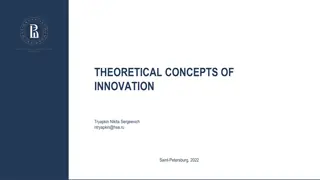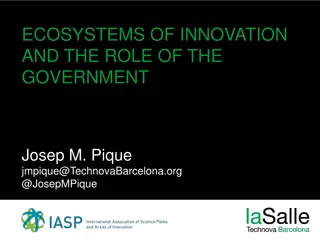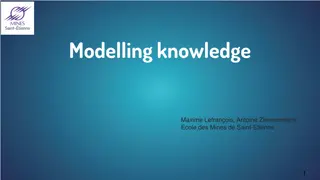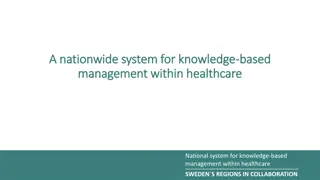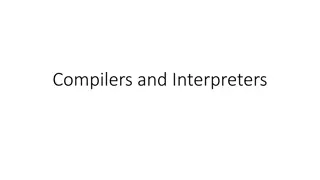Translating Knowledge for Healthcare Innovation
Seminar series on knowledge translation in healthcare innovation, focusing on the research-practice gap, e-health, and the impact of innovations. Learn about the process of translating research into practice to improve health services and strengthen the healthcare system. Explore the challenges and importance of evaluating KT programs and theories.
Download Presentation

Please find below an Image/Link to download the presentation.
The content on the website is provided AS IS for your information and personal use only. It may not be sold, licensed, or shared on other websites without obtaining consent from the author.If you encounter any issues during the download, it is possible that the publisher has removed the file from their server.
You are allowed to download the files provided on this website for personal or commercial use, subject to the condition that they are used lawfully. All files are the property of their respective owners.
The content on the website is provided AS IS for your information and personal use only. It may not be sold, licensed, or shared on other websites without obtaining consent from the author.
E N D
Presentation Transcript
KT Canada Seminar Series TRANSLATING KNOWLEDGE TO SUPPORT INNOVATION IN HEALTHCARE Marie-Pierre Gagnon Associate Professor Faculty of Nursing Universit Laval
OVERVIEW KT and innovation in healthcare The case of e-health Lessons learned Next steps Conclusions KT Canada Seminar Series, Toronto June 9th 2011
Innovation in healthcare Innovation: any idea, process, product or procedure, considered as new to the relevant unit of adoption [Rogers, 2003] Innovations are constantly entering the healthcare system These innovations aim at enhancing life expectancy, quality of life, diagnostic and treatment options, as well as the efficiency and cost effectiveness of the healthcare system [Varkey et al., 2006] KT Canada Seminar Series, Toronto June 9th 2011
Innovation in healthcare Only 14% of research knowledge will ever reach practice, through a process that takes an average of 17 years [Westfall et al., 2007] Research-practice gap KT Canada Seminar Series, Toronto June 9th 2011
Knowledge translation KT is the process from research to practice Iterative, dynamic and complex process that includes the synthesis, dissemination, exchange and ethically sound application of knowledge to improve health, to provide more effective health services and products and strengthen the healthcare system [CIHR, 2010]. KT Canada Seminar Series, Toronto June 9th 2011
Knowledge translation KT aims at addressing the research- practice gap Focuses on interactions between researchers and decision-makers in developing and implementing research in practice ANd9GcScIIwQfteRjoq-YkidV3x5lwEHLHFOFPZ44bt1dlgbOpXn3SLZlP_DwQ KT Canada Seminar Series, Toronto June 9th 2011
Knowledge translation Need to evaluate if KT programmes, structures, frameworks and theories are working or not, and WHY Afficher l'image en taille r elle KT Canada Seminar Series, Toronto June 9th 2011
The case of e-health E-health : the application of information and communication technologies (ICT) as tools to support health care [Mitchell, 1999] Limited evidence on the effects of e-health applications Increasingly regarded as promising tools for supporting access to quality health care services, information flow, integration of health care services, and interprofessional collaboration KT Canada Seminar Series, Toronto June 9th 2011
The case of e-health CIHR New Investigator (2007-2012): An integrated strategy of knowledge application for optimal e-health implementation Multidimensional study of factors influencing knowledge utilisation in implementing e-health innovations [Gagnon et al., 2009] Two cases: telehealth and electronic health record (EHR) KT Canada Seminar Series, Toronto June 9th 2011
The case of e-health Three levels of decisions in healthcare [Ferlie et al., 2000]: Political Organisational Clinical Frameworks, approaches and methods adapted to each level KT Canada Seminar Series, Toronto June 9th 2011
The case of e-health Decision makers were collaborating to the team: Policy makers involved in the Quebec EHR project (DSQ) and telehealth at the MSSS Representatives of professional associations Clinicians known as e-health champions Helped at identifying cases Facilitated contacts and access KT Canada Seminar Series, Toronto June 9th 2011
Study 1: Factors influencing e- health policies Historical analysis of the development of telehealth and EHR in Quebec (document analysis) Identification of critical incidents Interviews with key informants (n = 40), representing policy makers, project leaders, technology developers, and researchers KT Canada Seminar Series, Toronto June 9th 2011
Study 1: Factors influencing e- health policies Most policy decisions were based on political orientations and scientific knowledge Interviews confirmed the importance of involving key stakeholders for knowledge application KT Canada Seminar Series, Toronto June 9th 2011
Study 2: Organisational factors influencing e-health adoption Two case studies: Telehomecare in a remote region of Quebec [Gagnon et al., 2009] Electronic health record in primary care [Gagnon et al., 2010] Interviews with managers, clinicians, and technology providers (n = 29) Document analysis KT Canada Seminar Series, Toronto June 9th 2011
Study 2: Organisational factors influencing e-health adoption Telehomecare: Pilot experiment influenced decision-makers to continue the deployment of the solution Importance of using past experience to avoid pitfalls and insure an optimal decision-making process A regional forum helped knowledge translation between sites and within sites KT Canada Seminar Series, Toronto June 9th 2011
Study 2: Organisational factors influencing e-health adoption Electronic medical record in primary care: Organisation: open and supportive to change Evidence-based implementation strategy tailored to the local context and adoption pace Use of scientific knowledge was promoted by the project champion KT Canada Seminar Series, Toronto June 9th 2011
Study 3: Individual factors influencing e-health adoption Electronic medical record in primary care: Online questionnaire based on psychosocial theories [Ajzen, 1991; Davis, 1989; Triandis, 1980] Invitations sent to AMQ members 150 usable questionnaires received (rr 2%) KT Canada Seminar Series, Toronto June 9th 2011
Study 3: Individual factors influencing e-health adoption 51% of physicians were using some form of EHR Intention to use an EHR is rather high (5.9 on 7-point scale) Intention is explained at 53% (R2) by perceived usefulness and normative factors (social and professional norms) KT Canada Seminar Series, Toronto June 9th 2011
Study 3: Individual factors influencing e-health adoption Perceived usefulness comprises beliefs related to the positive impact of EHR on patient care and efficiency EHR utilisation is coherent with how physicians perceived themselves as professionals A positive social norm indicates that physicians perceive support from people and groups important to them. KT Canada Seminar Series, Toronto June 9th 2011
Study 3: Individual factors influencing e-health adoption Results are consistent with previous research on telehealth adoption by physicians [Gagnon et al., 2003] 506 usable questionnaires The model explained 81% of physician intention to use telehealth Intention was explained by personal and social norms KT Canada Seminar Series, Toronto June 9th 2011
Lessons learned Using a multidimensional and multi- methods approach helped identifying key issues affecting KT to support e-health implementation This strategy is useful to account for the complexity of healthcare However, generalisation is limited KT Canada Seminar Series, Toronto June 9th 2011
Lessons learned Collaboration with decision makers at the political level was difficult (changes in people and orientations, private consultants) Collaboration with managers and clinicians was very fruitful New research projects were developed based on these collaborations KT Canada Seminar Series, Toronto June 9th 2011
Lessons learned Technology developers were not initially considered as knowledge users Their role appears to be central in decisions regarding e-health innovation Partnerships between researchers and innovators Action research is clearly needed in order to foster knowledge translation in e-health implementation KT Canada Seminar Series, Toronto June 9th 2011
Next steps Tier 2 Canada Research Chair in Technologies and Practices in Health (starting April 2012) Research programme focusing on optimal integration of innovations in professional and organisational practices KT Canada Seminar Series, Toronto June 9th 2011
Next steps Four Research Axes: Axis 1: Individual, organisational and contextual factors Axis 2: Effects and impacts of technologies Axis 3: ICT as tools for improving knowledge translation Axis 4: Theories and methods for improving the use of evidence KT Canada Seminar Series, Toronto June 9th 2011
Next steps Examples of projects, Axis 1: Multilevel analysis of EHR adoption in primary care A multilevel model will be applied to assess the portion of variance in physician intention to use EHR explained by individual and organisational factors. Individual data already obtained Organisational data based on an adapted Organisational Readiness for Change instrument KT Canada Seminar Series, Toronto June 9th 2011
Next steps Examples of projects, Axis 2: Impact of ICT on health care human resources Systematic review [Gagnon et al., 2011] and multiple case study in remote regions of Quebec Explore the impact of ICT on recruitment and retention of nurses KT Canada Seminar Series, Toronto June 9th 2011
Next steps Examples of projects, Axis 3: Evaluation of the impact of interactive care methods (ICM) on nursing knowledge and practice Collaboration with knowledge users (Director of Nursing, technology provider) Evaluation will help informing decisions related to technological improvements and diffusion KT Canada Seminar Series, Toronto June 9th 2011
Next steps Examples of projects, Axis 4: Introducing patients perspectives in health technology assessment at the local level Collaboration with knowledge users (CHUQ HTA Unit, RUIS-UL, healthcare organisations, patient associations) Implement and evaluate strategies aimed at involving patients in HTA activities KT Canada Seminar Series, Toronto June 9th 2011
Conclusions KT is central to innovation in healthcare We know many factors affecting the use of knowledge in decisions The challenge now is to develop, implement, and evaluate KT strategies Collaboration with knowledge users is necessary, but requires innovative approaches KT Canada Seminar Series, Toronto June 9th 2011
Questions? Comments? Many thanks! KT Canada Seminar Series, Toronto June 9th 2011
References: Ajzen I. (1991) The Theory of Planned Behavior. Organizational Behavior and Human Decision Processes (50), 179-211. Canadian Institutes of Health Research (CIHR). More About Knowledge Translation at CIHR. 2010: http://www.cihr-irsc.gc.ca/e/39033.html Davis FD. Perceived usefulness, perceived ease of use, and user acceptance of information technology. MIS Quarterly. 1989;13:319-340. Ferlie E, Fitzgerald L, Wood M. Getting evidence into clinical practice: an organisational behaviour perspective. J Health Serv Res Policy 2000, 5(2):96-102. Gagnon M-P, Godin G, Gagn , C, Fortin J-P, Lamothe L, Reinharz D, Cloutier A. (2003). An adaptation of the Theory of Interpersonal Behaviour to the study of telemedicine adoption by physicians. International Journal of Medical Informatics. 2003 Sep;71(2- 3):103-15 Gagnon M-P, L gar F, Fortin J-P, Lamothe L, Labrecque M, Duplantie J. (2008). An integrated strategy of knowledge application for optimal e-health implementation: A multi method study protocol. BMC Medical Informatics and Decision Making. 2008 Apr 24;8:17. Gagnon M-P, Duplantie J, Fortin J-P, Lamothe L, L gar F, Labrecque M. (2009) Integrating scientific evidence to support telehomecare development in a remote region. Telemedicine and E-Health. 2009 Mar;15(2):195-8. KT Canada Seminar Series, Toronto June 9th 2011
References: Gagnon M-P, Pollender H, Tr panier A, Dupl a E, Ly BA. Supporting health professionals through information and communication technologies (ICT): A systematic review of the effects of ICT on recruitment and retention. Telemedicine and e-Health, 2011:17(4): 269-274 Graham ID, Logan J, et al. Lost in knowledge translation: time for a map? J Contin Educ Health Prof. 2006;26(1):13-24. Mitchell J. The cost effectiveness of telemedicine enhanced by embracing e-health. In: TeleMed 99, The seventh International Conference on Telemedicine and Telecare: 1999; London, U.K; 1999 Rogers EM. Diffusion of innovations (5th ed.). 2003. New York: Free Press. Triandis HC. Values, attitudes and interpersonal behavior. In: Nebraska Symposium on Motivation 1979: Beliefs, attitudes and values. University of Nebraska Press: Lincoln; 1980. Varkey P, Horne A, Bennet KE. Innovation in Health Care: A Primer. American Journal of Medical Quality. 2008; 23:382-8. Westfall JM, Mold J, et al. Practice-based research--"Blue Highways" on the NIH roadmap. JAMA. 2007;297(4):403-6. KT Canada Seminar Series, Toronto June 9th 2011



